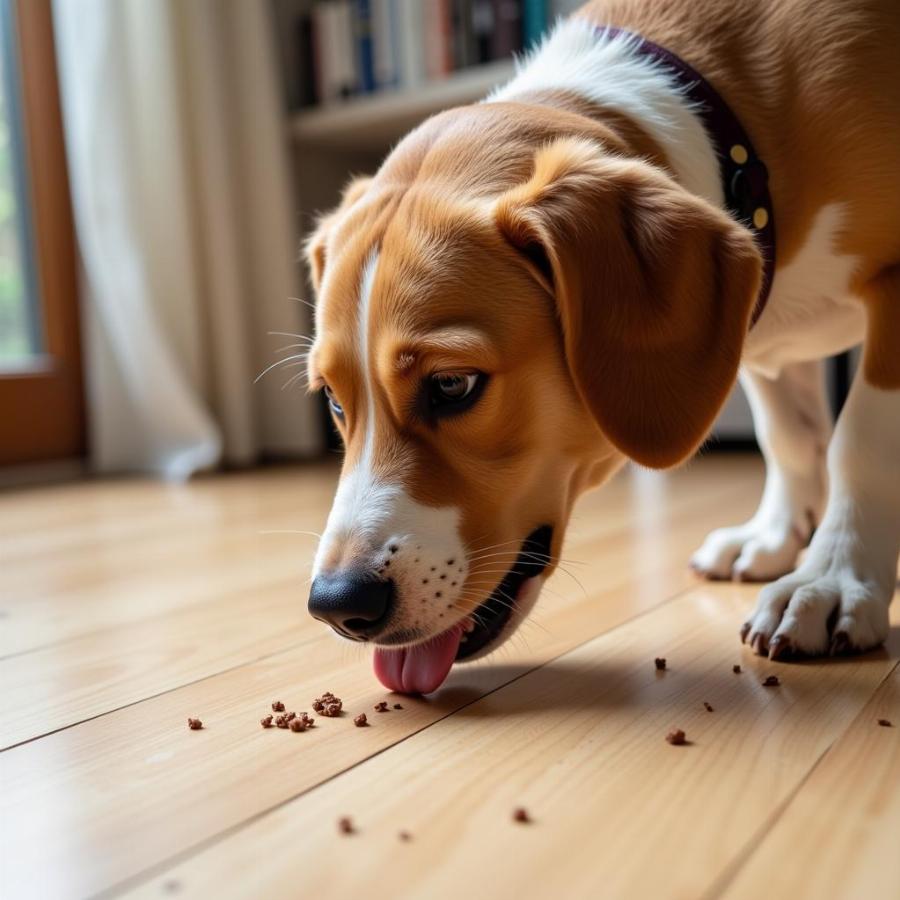The phrase “dog licks pusy” is often searched online, likely driven by curiosity or concern about canine behavior. While this specific phrasing may be crude and inaccurate, it points to a genuine question about why dogs lick certain areas. This article aims to explore the various reasons behind a dog’s licking behavior, separating fact from fiction, and offering valuable insights into your furry friend’s world. We’ll delve into the science behind licking, common motivations, and address any potential health concerns.
Decoding Your Dog’s Licks: What’s Really Going On?
Dogs lick for a multitude of reasons, and it’s important to understand that licking is a natural, instinctual behavior for them. Just like humans communicate through words, dogs rely heavily on body language, and licking is a significant part of their communication repertoire. It can express affection, submission, anxiety, or even just plain curiosity. It’s crucial to consider the context of the licking – where they’re licking, how often, and their overall demeanor – to accurately interpret their message.
Medical Reasons Behind Excessive Licking
While licking is often harmless, excessive licking, particularly focused on a specific area, can indicate an underlying medical issue. Allergies, skin irritations, infections, and even pain can trigger increased licking. If your dog is persistently licking themselves, it’s essential to consult a veterinarian to rule out any potential health problems. Early detection and treatment are crucial for your dog’s well-being.
Is Your Dog Licking Out of Affection?
One of the most common reasons dogs lick is to show affection. Think of it as a doggy kiss! Licking releases endorphins, creating a sense of pleasure and well-being for both the dog and the person being licked. This behavior often stems from puppyhood, where mother dogs lick their pups to groom them and strengthen the bond.
Could Anxiety Be the Culprit?
Anxiety can also manifest as excessive licking. Just like humans bite their nails when nervous, dogs may lick as a self-soothing mechanism. Changes in routine, loud noises, or separation anxiety can all trigger this behavior. Identifying and addressing the source of your dog’s anxiety is key to reducing excessive licking.
Licking and Exploration: A Dog’s Way of Discovering the World
Dogs explore the world through their senses, and their tongues play a crucial role. Licking allows them to gather information about their surroundings, tasting and smelling new objects and surfaces. This is perfectly normal behavior, especially in puppies and curious adult dogs.
The Taste Test: Why Your Dog Licks Everything
Believe it or not, dogs may simply enjoy the taste of certain things. Sweat, lotion, and even certain cleaning products may contain salts or other appealing flavors. While this isn’t necessarily harmful, it’s essential to ensure that your dog isn’t licking anything toxic.
 Dog licking floor
Dog licking floor
What to Do About Excessive Licking
If your dog’s licking is becoming a concern, don’t hesitate to seek professional advice. A veterinarian can help determine if there’s an underlying medical condition, while a certified dog trainer can offer guidance on managing anxiety-related licking. Providing your dog with plenty of mental and physical stimulation can also help reduce stress and curb excessive licking.
Conclusion: Understanding Your Dog’s Licking Behavior
Understanding why your dog licks is crucial for responsible pet ownership. While the search term “dog licks pusy” may be misleading and inappropriate, it highlights the need for accurate information about canine behavior. By recognizing the various motivations behind licking, from affection to anxiety, you can better interpret your dog’s communication and address any potential health or behavioral concerns.
FAQs About Dog Licking
- Why does my dog lick my feet? This could be affection, a sign of submission, or simply because they enjoy the salty taste.
- Is it harmful if my dog licks my face? While generally harmless, dog saliva can carry bacteria. It’s best to avoid letting your dog lick your face, especially near your mouth and eyes.
- How can I stop my dog from licking excessively? Identify the underlying cause. Consult a veterinarian or dog trainer if necessary.
- What are the signs of anxiety in dogs? Excessive licking, panting, pacing, and destructive behavior can all be signs of anxiety.
- Why does my dog lick the air? This can be a sign of nausea, a compulsive behavior, or a response to a strange taste or smell in the air.
- Why does my dog lick their paws excessively? This can indicate allergies, skin irritations, or even boredom.
- Is it normal for dogs to lick other dogs? Yes, licking is a common form of social interaction between dogs.
Related Articles and Resources
- Understanding Dog Body Language
- Canine Anxiety: Signs and Solutions
- Choosing the Right Food for Your Dog
Beaut Dogs is your go-to resource for all things dog-related, providing reliable and in-depth information on the fascinating world of canine companions. From breed-specific guides to expert advice on health, training, and nutrition, we’re here to help you navigate the joys and challenges of dog ownership. For personalized support and answers to your specific questions, please contact us at Email: [email protected]. Let Beaut Dogs help you provide the best possible care for your beloved furry friend. Visit us at https://beautdogs.com.